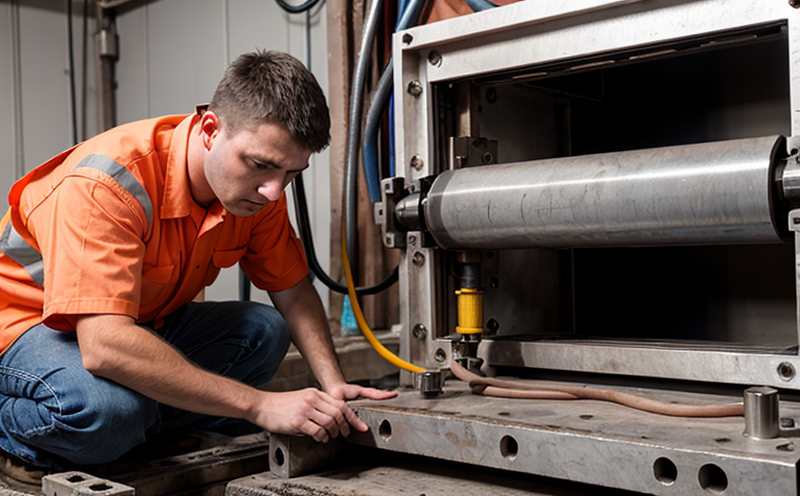IEC 60068 2 27 Mechanical Shock Testing of LED Modules
The IEC (International Electrotechnical Commission) standard IEC 60068-2-27 specifies the procedure for determining the resistance to mechanical shock of electrical equipment and apparatus. This particular test is crucial in ensuring that LED modules can withstand sudden, severe shocks without compromising their functionality or safety.
The test simulates the effects of accidental impacts such as dropping devices on hard surfaces, vehicular accidents, or other similar scenarios where a component may experience significant mechanical stress. In this context, it ensures that the LED module will continue to function reliably under real-world conditions, thereby enhancing product durability and consumer safety.
During the test, the LED module is subjected to an impulse-like force along its primary axis of operation or orientation. The force applied can vary depending on the specific requirements outlined in the standard but typically ranges from 20 Hz to 5 kHz for most applications. The specimen is placed on a platform that oscillates horizontally at high speed, simulating the shock experienced during impact.
Test conditions may also involve environmental factors such as temperature and humidity levels, which can affect the mechanical properties of LED modules. Compliance with these environmental parameters ensures accurate test results reflecting real-world scenarios more closely.
The acceptance criteria for this type of testing are stringent; they ensure that no damage occurs to the LED module during or after exposure to mechanical shocks within specified limits. Any visible cracks, fractures, or significant deviations from initial performance metrics indicate failure according to IEC 60068-2-27.
For industries heavily reliant on electronic components like LEDs, compliance with such standards is essential for maintaining high-quality products and ensuring customer satisfaction. By adhering strictly to these guidelines during manufacturing processes, companies can enhance their reputation while meeting regulatory requirements.
In summary, IEC 60068-2-27 provides a robust framework for assessing the resilience of LED modules against mechanical shocks. This testing method helps manufacturers improve product quality and reliability by identifying potential weaknesses early in development stages before mass production begins.
Why It Matters
The importance of conducting IEC 60068-2-27 Mechanical Shock Testing on LED modules cannot be overstated. In today’s fast-paced technological environment, where consumer expectations are higher than ever before, ensuring the robustness and longevity of electronic components is paramount.
LEDs play a critical role in various applications ranging from automotive lighting systems to commercial signage displays. Their performance directly impacts user experience and safety. A single malfunction due to mechanical shock could lead to significant financial losses or even dangerous situations if used incorrectly.
By incorporating IEC 60068-2-27 into the quality control process, manufacturers can demonstrate their commitment to excellence by delivering products that meet international standards for reliability and safety. This not only builds trust among customers but also opens up opportunities for expansion into new markets where stringent regulatory compliance is required.
Moreover, successful completion of this test provides valuable insights into how different materials and designs perform under stress conditions. Engineers can use these findings to optimize future iterations of the product, leading to more efficient manufacturing processes and reduced costs associated with rework or recalls.
Benefits
The advantages of implementing IEC 60068-2-27 Mechanical Shock Testing extend beyond mere compliance; they offer numerous benefits that contribute significantly to overall business success:
- Enhanced Product Reliability: Ensures consistent performance across all units produced, reducing the likelihood of failures in critical applications.
- Improved Safety Standards: Protects end-users from potential hazards caused by compromised components that fail under shock loads.
- Increased Market Competitiveness: Demonstrates a commitment to quality and innovation through adherence to leading industry practices.
- Potential Cost Savings: Identifies issues early in the development cycle, minimizing costs related to late-stage modifications or recalls.
- Better Customer Satisfaction: Builds long-term relationships by providing dependable products that meet or exceed customer expectations.
- Ease of Regulatory Compliance: Simplifies the process of meeting necessary regulatory requirements with accurate and reliable test results.
- Innovation Opportunities: Encourages continuous improvement through detailed analysis of test outcomes, fostering a culture of excellence within organizations.
These benefits collectively contribute to creating value not only for manufacturers but also for consumers who benefit from safer, more dependable LED products in their daily lives.
Eurolab Advantages
At Eurolab, we pride ourselves on offering comprehensive testing services that go above and beyond industry expectations. Our expertise in executing IEC 60068-2-27 Mechanical Shock Testing for LED modules sets us apart from other laboratories:
- State-of-the-Art Facilities: Equipped with advanced equipment capable of simulating diverse shock scenarios, ensuring precise and repeatable results.
- Experienced Technicians: Our team comprises highly trained professionals who possess extensive experience in both theory and practice related to electrical engineering and materials science.
- Comprehensive Reporting: Detailed reports are provided following each test run, including recommendations for improvement where necessary.
- Customizable Solutions: Tailored testing programs can be designed specifically according to client needs, ensuring comprehensive coverage of all relevant aspects.
- Supportive Guidance: Technical advice and support are readily available throughout the entire project lifecycle, from initial consultation to final reporting.
- Consistent Quality: Our commitment to quality assurance ensures that every test conducted adheres strictly to international standards like IEC 60068-2-27.
- Fast Turnaround Times: Efficient processes allow us to deliver results quickly, enabling timely decision-making and project progression.
With Eurolab as your partner in testing services, you can rest assured that your LED modules will undergo rigorous evaluation ensuring their robustness and reliability meets the highest standards.





